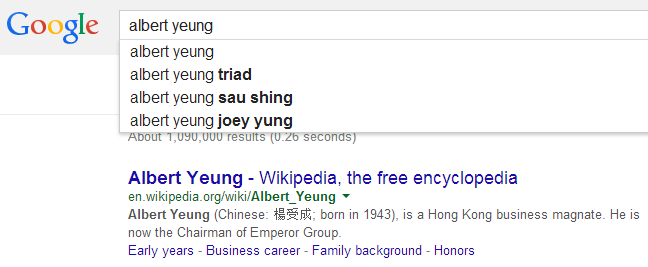Albert Yeung Sau Shing, 71, chairman of the Emperor Group, is suing Google for defamation due to those terms, which include “Albert Yeung triad,” “Yeung Sau Shing perverted” and “Yeung Sau Shing Sun Yee On.” Sun Yee On is the name of a triad, or Chinese organized crime group, active in Hong Kong.
 The Internet does, in fact, turn up evidence that Yeung has a legal history. In 1981 he was sentenced to nine months in prison for attempting to pervert the course of justice by offering money to an assault victim to persuade him not to testify against his attacker. In 1995 Yeung was charged with criminal intimidation and false imprisonment of a former employee, but four witnesses, including the victim, claimed to be unable to remember anything relating to the crime and Yeung was acquitted. The victim was held in contempt of court for failure to testify, despite claiming that his failure was due to fear. In 1998 Yeung admitted to insider dealing and was penalized US$ 2.67 million, although his actions were not considered criminal under Hong Kong law.
The Internet does, in fact, turn up evidence that Yeung has a legal history. In 1981 he was sentenced to nine months in prison for attempting to pervert the course of justice by offering money to an assault victim to persuade him not to testify against his attacker. In 1995 Yeung was charged with criminal intimidation and false imprisonment of a former employee, but four witnesses, including the victim, claimed to be unable to remember anything relating to the crime and Yeung was acquitted. The victim was held in contempt of court for failure to testify, despite claiming that his failure was due to fear. In 1998 Yeung admitted to insider dealing and was penalized US$ 2.67 million, although his actions were not considered criminal under Hong Kong law.
In a decision released Tuesday, Deputy High Court Judge Marlene Ng rejected a motion from Google to dismiss Yeung’s case. Google’s lawyers had claimed that because suggestions are generated, “without human input,” that the company was not liable for them, and that Yeung would be better off complaining to the websites which had published the material he found defamatory.
The judge, however, found that Google can and has censored material, including editing results to “improve the user experience” and blocking results for security or legal reasons. It has removed personal information, child sexual-abuse content and copyright infringing material.
A German court ruled in 2013 that Google had to remove libelous terms attached to names, in a case brought by the founder of a nutritional supplements company who found the words “Scientology” and “Betrug” (German for scam or deception) suggested after his name. The decision stated that Google was responsible for monitoring search suggestions, but only became responsible after being notified of an unlawful violation.





